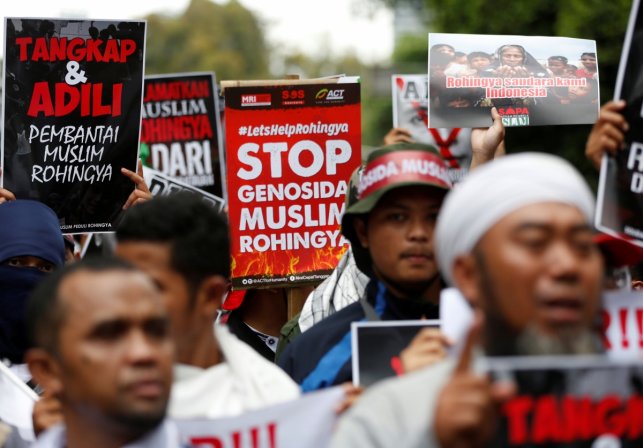
With more reports of gang rape, torture and the killing of the Rohingya ethnic minority in Myanmar streaming in, the United Nations called for immediate action to stop the "ethnic cleansing" that has triggered a mass exodus of Muslim refugees into Bangladesh.
The Myanmar troops are "killing men, shooting them, slaughtering children, raping women, burning and looting houses, forcing these people to cross the river," John McKissick, head of the United Nations refugee agency in the Bangladeshi border town of Cox's Bazar, said.
According to the UN, more than 30,000 Rohingya have fled the country after violence escalated last month, triggering a humanitarian crisis. "It's very difficult for the Bangladeshi government to say the border is open because this would further encourage the government of Myanmar to continue the atrocities and push them out until they have achieved their ultimate goal of ethnic cleansing of the Muslim minority in Myanmar," McKissick added.
The latest Myanmar crackdown on the 'stateless' Rohingya people started after an armed militant raid of three Myanmar border posts last month that killed nine officers. Myanmar troops killed eight assailants in the counter attack and clashes continued on the following days, triggering massive exodus of the local people looking for cover within Bangladesh borders.
According to Radio Free Asia, the motive of the attack on Myanmar border posts was the Myanmar government's decision to pull down illegally built mosques and other religious buildings in the townships. The Buddhist nationalists in Myanmar call Rohingya illegal immigrants from Bangladesh while rights organisations call them one of the world's most persecuted peoples. The 1.1 million stateless Rohingya people in Myanmar say they belong there as their predecessors have lived in the country for generations. Thousands of Rohingya people live in refugee camps, in deplorable conditions.
Amnesty International said the reprisals after the militant attack on border post went beyond all rationale and became a "collective punishment" of the Rohingya. "The response of the army to attacks on security forces six weeks ago went far beyond what was necessary and proportional," the rights watchdog said.
News agencies reported dire scenes in the Rakhine border town where residents recounted stories of brutal torture, missing children and gang rape of women. "They (Myanmar's military) took my two boys, aged nine and 12 when they entered my village. I don't know what happened to them ... They took women in rooms and then locked them from inside. Up to 50 women and girls of our village were tortured and raped," a local Muslim resident named Mohammad told Agence France-Presse.
Another resident told the agency that Myanmar troops stormed into a village and fired indiscriminately on residents as they tried to escape.
The Myanmar government led by de-facto ruler Aung San Suu Kyi has rejected the allegations of torture of the Rohingya.
"There is increasing recognition of the fact that 'ethnic cleansing' of the Rohingyas, — A GENOCIDE — is taking place in Rakhine, Myanmar," Global Research said in a report.








